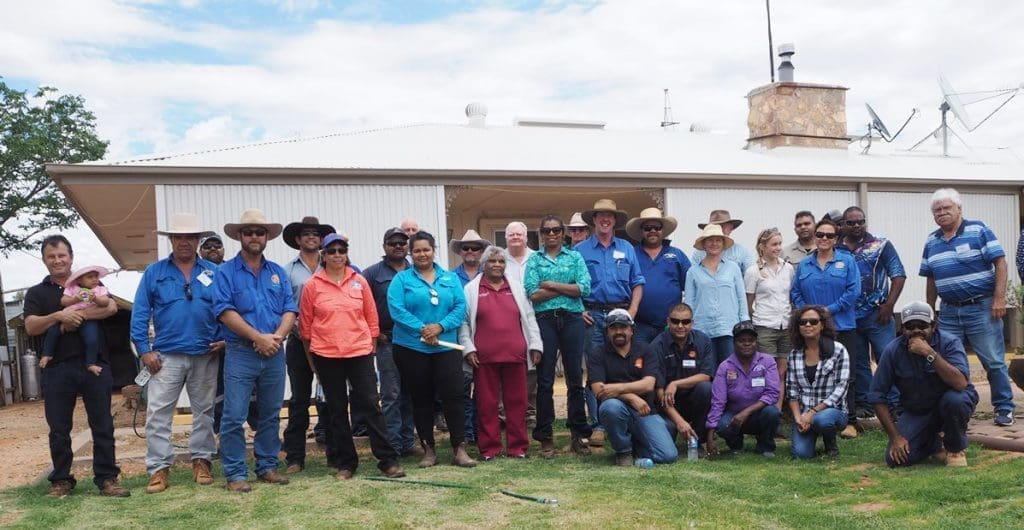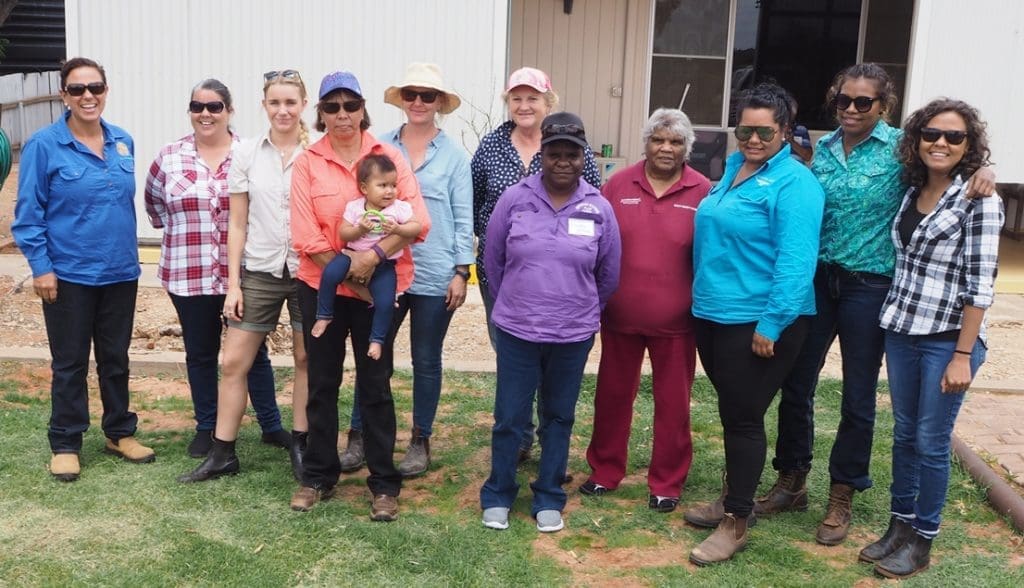
Indigenous stockmen and women participating in the ILC-PIRSA sponsored Indigenous Cattleman’s Workshop held last week on Roxby Downs Station and Port Augusta, SA. Click on image for a larger view.
BUSINESS management, best pastoral practice, managing mental health, and creating robust peer support networks across Australia were key themes discussed during an Indigenous Cattleman’s Workshop held in Port Augusta, South Australia last week.
The workshop was a first for South Australia, and is part of the North West Indigenous Pastoral Project, which has helped train and employ 67 pastoral workers and return more than 272,000 hectares of indigenous-owned land back to sustainable, commercial primary production.
The workshop also hosted indigenous pastoral workers from remote parts of Western Australia, the Northern Territory and Queensland, who join people from SA’s aboriginal-owned stations. Collectively, the group manage more than 70,000 head of cattle.
The three-day program included a visit to Kokatha Pastoral Co’s Roxby Downs Station. With a third of the enrolled workshop participants being young women, the event reflects the rise of Indigenous women embracing promising management career pathways in the cattle industry and other forms of agriculture.
The NWIPP project – which has run for three years – is jointly funded by Primary Industries and Regions SA and the Indigenous Land Corporation, and helps deliver primary industries training, employment, and long-term business outcomes for six important indigenous-owned properties in SA: Andamooka, Purple Downs, and Roxby Downs Stations (Kokatha Pastoral Pty Ltd); Emeroo Station (Bungala Aboriginal Corp); Mabel Creek Station (AMY Nominees Pty Ltd) and parts of the APY Lands (Anangu Pitjantjatjara Yankunytjatjara).
Last week’s workshop follows the proven track record of similar ILC projects and workshops in QLD, WA, and NT to increase the capability of current and potential indigenous business partners, and aid real long-term economic, environmental, social, and cultural benefits to Indigenous communities and the wider region.
The first day of the workshop fell on November 21 – National Ag Day – serving as a timely opportunity to acknowledge the important role Indigenous pastoralists have had, and will have, in the Australian pastoral industry.
The SA Government has committed almost $2.9 million to the NWIPP since it began in 2015, and ILC has provided a further $700,000 in funding for property management planning, plant, equipment and infrastructure development to enable land to be brought back into production.
Opportunities for Indigenous land-based economic development
ILC chief executive John Maher said the pastoral project in South Australia fitted the nation building mandate of the ILC to assist the economic empowerment of Indigenous Australians and their future prosperity.
“We are constantly searching for new ways to build opportunities for Indigenous Australians in the pastoral, tourism and environmental sectors, because that is where the primary opportunities exist for Indigenous land-based economic development,” Mr Maher said.
“Indigenous Australians hold extensive areas of pastoral lands and have a rich heritage with the pastoral industry, and this invaluable experience along with knowledge and skills of traditional land management practices mean Indigenous Australians have a unique contribution to make to the pastoral industry,” he said.
Mr Maher said the ILC’s role was to create opportunities to unlock this potential by generating new enterprises and developing sustainable and meaningful career pathways for local Indigenous people involved with NWIPP.
The Indigenous Cattlemen’s Workshops, like that held at Port Augusta last week, was one way ILC is doing this, to support Indigenous Australians’ aspirations to be more involved in the pastoral industry at a deeper level.
“This workshop brings together Indigenous cattlemen and women from northern and southern parts of Australia, to share their experiences and learnings,” Mr Maher said.
“We’re proud of our involvement in the NWIPP which has brought more than 272,000 hectares of Indigenous-held land into productivity, and has seen 21 of the Indigenous pastoral workers employed during program move on to independent employment in the pastoral, mining or construction sectors,” he said.
“The outcomes of this project are ongoing with mentoring, knowledge sharing and business support just as critical as infrastructure development and pastoral production. We believe partnerships such as this one contribute to real long-term economic, environmental, social, and cultural benefits to Indigenous communities and the wider region.”

Women attending the workshop during the Roxby Downs Station homestead visit included from left Nicole Thompson (Twin Hill Station, NT), Mel Agius (ILC), Daisy Goodwin (Dept of Ag WA), Gina Howard holding daughter Aleen (ILC/HGH Contracting, NT), Sophie Keen (ILC), Sandy Clinch (APY), Brenda Kepple (Merepah Station, Qld), Barbara Amos (Roxby Downs, SA), Madeline Anderson (Yallalie Station, WA), Darrylin Gordon (Lamboo Station, WA), Lexine Mourambine (Yallalie Station, WA). Click on image for a larger view.
About the Indigenous Land Corporation
The Indigenous Land Corporation is a corporate Commonwealth entity established in 1995 to assist Aboriginal and Torres Strait Islander people acquire and manage land to achieve economic, environmental, social and cultural benefits.
The ILC has priority outcomes for achieving Indigenous benefits:
- Access to and protection of cultural and environmental values: The ILC recognises the importance of land to Indigenous people’s cultural identity. We are committed to assisting Indigenous people acquire and manage land of cultural and environmental significance, and to protecting and maintaining the cultural and environmental values of land.
- Socio-economic development: The ILC assists projects that deliver social and economic outcomes for Indigenous Australians. Priority is given to projects that provide sustainable employment and training that leads to employment. The ILC believes that sustained employment creates a range of benefits for Indigenous people, including increased standards of living, income and improved health and wellbeing.
By committing to these priorities, the ILC is helping to build a secure and sustainable Indigenous land base, now and for future generations.
The North West Indigenous Pastoral Project was introduced in 2015 supported by $1.4m of funding from the Jobs Accelerator Fund. A further $1.5m over two years was committed in the 2016-17 SA State Budget to support the employment of additional Indigenous pastoral trainees and continue to lift the commercial production capabilities of the participating properties. Additional support and collaboration throughout the NWIPP has been provided through the Work for the Dole Program, Natural Resources Alinytjara Wilurara, TAFE, BHP Billiton and Indigenous Land Corporation’s Australian Indigenous Agribusiness Co.
OBE Organic initiates its Reconciliation Action Plan
Meanwhile, Australia’s oldest organic beef marketing company OBE Organic has become one of the first Australian agribusinesses to adopt a Reconciliation Action Plan (RAP).
RAPs, administered by Reconciliation Australia, are practical action plans for organisations to create social change and economic opportunities for Aboriginal and Torres Strait Islander peoples through relationships, respect and opportunities.
OBE Organic managing director Dalene Wray said she hoped OBE Organic’s RAP would encourage other agribusinesses to consider developing their own plans.
“In the spirit of reconciliation, we acknowledge the valuable contribution that Australian Aboriginal and Torres Strait Islander peoples have made and continue to make in our production region and within our supply chain,” she said.
“The process of developing a Reconciliation Action Plan has already increased our understanding and respect of Aboriginal & Torres Strait Islander peoples.
“Importantly though, the RAP isn’t just about doing what’s right. Implementing this plan is consistent with our FLOURISH sustainability emphasis on people and diversity, because we know encouraging a range of thinking and looking to provide equal opportunities for everyone will benefit us over the long term.”
RAPs are created based on a template provided by Reconciliation Australia.
The development and implementation of OBE Organic’s RAP is being guided by a Working Group including Joyleen Booth (a Wangkangurru woman and an OBE Organic supplier from Murnpeowie station in north east South Australia) and Amy Brooks (a Wulli Wulli woman who has over ten years’ experience in the Australian beef and food industry).
“Working with Joyleen and Amy has been one of the most rewarding experiences of my career. Developing our RAP has made me look at our business in a new light, and I would recommend any company to undertake this process,” Ms Wray said.
“The RAP template makes creating a RAP relatively simple, but like any plan the challenge will be in executing it well.
“The creation of our RAP is just the start of our reconciliation journey. We expect to learn a great deal as we work with Amy, Joyleen and other members of the Aboriginal and Torres Strait Islander community, and we hope our journey will allow us to make a genuine and tangible contribution to reconciliation in Australia.”
Since 2006, over 970 organisations have created a RAP, with a handful of these being agribusinesses including GrainCorp, Incitec Pivot, and the Indigenous Land Corporation.
Source: OBE
